KNOWLEDGE THE CITY

✴ featured
FEBRUARY 2024 | 15
PHOTOS COURTESY OF WILL BOECHLER
Portland State University’s motto, “Let Knowledge Serve The City” is an engraved adage suspended from parking deck 1 so the masses of downtown can read its yellow engravings. Dr. Bright Alozie, a professor of Black Studies, is someone who makes the yellow shine a little brighter against the faded concrete. Dr. Alozie has been featured in a few of Sentinel’s articles, “How to Write About African Women” and “How to Write About African Children” which are satirical pieces playing on the stereotypes that surround Black and African narratives. Dr. Alozie is a Nigerian-born scholar-activist and historian whose research falls into four broad and overlapping areas: (1) social and political history; (2) sexuality, women, and gender; (3) protests and people power in relation to social movements and African people’s experiences of resistance; (4) oral history and methodologies. Within these intersections, he adopts “a history from below” approach to center “the experiences, voices, and research of people of [Africa and] African descent as a way to challenge dominant narratives” as set out in the Black Studies program description. Many of the topics he teaches hold false narratives derived from Eurocentric beliefs which is why Dr. Alozie is such an imperative piece to Portland State’s education. He is passionate about rectifying historical inaccuracies and providing his students empowerment through knowledge. Class by class, step by step, Dr. Alozie is serving our city with knowledge.
The Pacific Sentinel Associate Editor Will Boechler and I were fortunate enough to get an hour of Dr. Alozie’s time to ask him questions, be stunned by his words, and listen to a little of his poetry!
Eva: Thanks again for meeting with us! I guess we’ll just start out with this first question just to get to know you and what your role is at Portland State by asking, when did you start working at Portland State?
Alozie: First, thank you for this opportunity to share both my experience here at Portland State (my teaching and research) and of course, talk about Black Studies Department. I really appreciate that there is a special focus and feature for Black History Month. When I received your email, I couldn’t have been any happier that The Pacific Sentinel decided to spotlight Black History Month.
So, talking about when I started working at Portland State, first, I want to state that I am a scholar activist, a storyteller, a student of history– I believe that I am a student for life– there’s no end to learning. My work speaks to disciplinary and multidisciplinary conversations around and among African and Black Scholars, Black Studies, history, women, and gender studies. As a result of
my scholarship [and] my teaching portfolio, Portland State University found me fit to hire me as part of the SGRN cluster hire. They hired me in 2021 as a full-time tenure track assistant professor of Black Studies in the Black Studies Department. I am also an affiliate faculty in the History Department and the Women/Gender/Sexuality Studies Department.
Before this time, I taught at West Virginia University, StrayerUniversity in Virginia, University of Liverpool where I got my second masters degree. Then, University of University of Nigeria, Nsukka where I proudly finished my bachelors magna cum laude. When I taught there, I was a very young junior lecturer at the age of (barely) 22 when I started. So, that has been my journey for about twelve years. I’ve been in academia, I’ve loved the academe, I’ve loved teaching, and I’ve loved the research.
My current research spans the period of the Atlantic Slave Trade up to the modern era and the contemporary era. It embraces the intersectional five fields of Nigerian, African, and Black historical studies. The fields are colonial and socio-political history, women, gender, and sexuality, petitions and documented sources, memory politics, oral histories, and social movements. I like these fields because they are important to both why I decided to join this department, why I wanted to be a scholar activist, why I am a storyteller and of course, a historian.
“I have to render services to the university, maybe at the administrative level, but more importantly, and for what Black studies represents, I have to support my colleagues, be part of efforts that may contribute to the community. After all, our motto is ‘Let Knowledge Serve The City.’ ”
16 | THE PACIFIC SENTINEL
All my degrees, my Bachelors, my Double Masters, my PhD have been in African History– specifically African History, or International studies, or Women’s Studies.
Eva: Thank you, that was awesome information. So, we kind of talked about this a little bit, about your role in the program as a professor, but we are wondering what classes do you teach and which one is your favorite?
Alozie: For starters, as a professor I have the primary teaching and research engagement. So I have to teach classes and at the same time I have to do research because Portland State is a research institution. In addition to teaching and research, my role also includes service commitment and service engagement. I have to render services to the university, maybe at the administrative level, but more importantly, and for what Black studies represents, I have to support my colleagues, be part of efforts that may contribute to the community. After all, our motto is “Let Knowledge Serve The City’’. For instance, I am a part of “Africa House’’ which is the African Immigrant and Refugee Organization [in Portland] and so many other organizations that speak to Black causes.
I do give talks and lectures outside of Portland State and also within Portland State and of course, at conferences, workshops, and seminars where I share my research.
I teach a range of classes. I have to say that I am the only full-time tenure track faculty who is an African scholar in Black Studies Department. This is important because Africa is at the center of my research and conversations around Black Studies. So that’s why the range of courses
I teach include: African History Pre- and Post-1800, Intro to African Studies, Post Colonial Studies of Africa, Black Studies Methodologies, and Intro to Black Studies. When joining Portland State back in 2021, I realized that there were a few courses missing. Especially in regard to women, gender, sexuality. So I introduced three new courses. One is, “Women in African History.” The other is “Gender and Sexualities in Africa.” And then “Protests, Activism, and People In Power in Contemporary Africa.”
Which is my favorite… frankly, I’m tempted to say all of them, but I’ve really enjoyed teaching Women in African History just for the very significance of that course and for how engaging it is and the lessons my students learn. A lot of people know little to nothing about Africa and when it comes to African women, my students are always in awe when they hear, for instance, that in Africa, in precolonial times, women had power. Women had agency. You know, in pre-colonial times, a woman could become a man! Gender was very fluid. The excitement and glee that I see when my students get this new knowledge, I think, nothing surpasses it. (Women Studies) is also one of the courses I’ve had the most success in terms of post knowledge production. My students have produced excellent projects and essays– some of which I have worked with and collaborated with them to get published–of course, I did publish one piece in The Pacific Sentinel, a satirical piece on “How to Write About African Women”.
Specifically, I also coordinate the African Studies Certificate Program and before I joined Portland State,

FEBRUARY 2024 | 17
this program was not functional and it was housed in the Department of International and Global Studies. I was really grateful that I took charge along with my colleagues to revive the program and it’s going to launch in the Fall of 2024. I will be the main advisor for this program. The certificate is part of the Black Studies Program here at PSU that provides students with a wealth of knowledge–tailored knowledge about the African continent. We recognize Africa’s central role in global history so our curriculum provides our students with unique opportunities to delve into these wide array of themes of African history, African culture, African politics just to mention a few. We are trying to address this scholarly curiosity of our students in relation to the study of Africa. So it’s part of that commitment and serves an intellectual function within our campus. Of course in the certificate program, we are going to give our students many major recognitions for their African related work.
So yeah, that’s pretty much my role in the program. As the need arises, I’m happy to serve the department and the university.
Eva: Thank you. It seems like you’ve really built up the program and it seems to be really flourishing. It sounds really awesome! I’m going to move on to the next question which goes into you being an educator and professor. What is your goal as an educator when you’re teaching these courses within the Black Studies program?
Alozie: My primary goal as an educator is to use my expertise and use knowledge to empower and liberate. Empower my students to know that whatever they are learning right now is powerful knowledge. It changes how they think or how they may have felt about a continent that is most grossly misunderstood.
I want to impact lives. I want to impact minds with my teaching and, of course, my research because they go hand in hand. So, I don’t just teach for the sake of it. I am also very passionate about what I teach. I mean, you could tell from my email with you. I want to get a productive response from this (the article), I want to talk about it, I want many people to see this. I always want my students to see that I am a passionate professor. I want them to be inspired positively so. In pursuing my goal as an educator, I believe in this African philosophy of Ubuntu which means, “I am because you are”. In the making of who we are in Black StudiesBlack, in the shaping of knowledge, I want to integrate my students– they are part of that knowledge production– the knowledge is empowering to them– the knowledge shapes who they are. So if I can achieve that at the end of a particular class, I’ll say, oh goodness gracious, I have gotten my learning objectives.
I emphasize them because I teach here at Portland State University. Oregon itself is a pretty predominately white institution. Many undergraduate students do not even have any understanding of African history or geography. They have mainly learned about Africa through singlestory narratives or misinformation stereotypes propagated by the American media. My goal is to shut down that narrative and by extension, shut down the stereotypes about Black people. I live for that. I breathe that goal within me.
As a result, my courses are structured around four frameworks: centering African or Black voices, teaching about Africa’s immensity, identifying Africa as the heart of humanity, connecting Africa across disciplines, and of course, teaching Africa to affirm identities which might be African identities or, broadly, Black identities. Throughout my class, I create that classroom environment where I engage my students in very meaningful thinking, interactive learning, and practical application of the lessons they learn so they can appreciate the diversity and nuances of the continent they are learning about. So that is my goal
Eva: Awesome, I love that answer.
Will: That was so well said. I love that.
Eva: We’re going to take a little shift to talk about the program as a whole by wondering, what would you say makes this program stand out from the rest of the PNW? I noticed that on the website, you mention how this program is different from the rest of the Black Studies programs around the Pacific Northwest.
Alozie: This is a very loaded question that goes way back into the history of the department where I’ll just try to be as brief as possible. Forgive me for being very detailed, I am a historian–we tell stories a lot.
So, as you may have read from the website, Portland State University is one of the very few institutions of higher education in the Pacific Northwest that offers the degree in Black Studies. The program was founded in 1970 and the department and program itself is unique in how we deal with research, teaching, and further engagements that cover Africa, the United States, the CariBean, South America, Europe, Asia as well.
18 | THE PACIFIC SENTINEL
“When we look at it now, we have grown to become such a force in the university. We are a service university. We provide viable and useful services to the university that go beyond teaching.”
Looking at our past, looking at the social dynamic of the United States and cultural dynamic, this department stood out as one that was born out of activism. It was born out of that commitment to challenge a very Eurocentric view of Black people’s pasts and Black people’s experiences. The program was born out of the need to challenge Western Eurocentric views of Black people’s present and the assumption that this Eurocentric view would somehow, some way shape the future of Black people, the future of Black histories, the future of Black education, the future of Black excellence. So, that was it. We set up as a very very unique department to challenge the intellectual and academic environment. Back then in 1970, the environment was pretty unpredictable and if I must say, was also not so kind to people of color. This was why the department was created. This is why it became, not just a discipline, but an empowering tool.
When we look at it now, we have grown to become such a force in the university. We are a service university. We provide viable and useful services to the university that go beyond teaching. That goes beyond research. Specifically, we are committed to addressing the needs of Black people. The needs of the Black community. Allow me to say that the liberatory nature of the department is one of the most fascinating things about it. We all know our stuff! We want to say yes to liberation, yes to power, yes to empowering Black excellence, Black history, Black voices.
As a department, we did not want to be looked down on. We do not want to be trivialized or politicized. We wanted to stand on our own and wanted to make positive impacts and we’ve continued to make that impact. When I look at how unique we have positioned ourselves both as a growing faculty, in our research, in our engagement that goes beyond Portland State University. We couldn’t be any prouder of how far we have come. I think we started with just a few professors and if I remember vividly, Emeritus Professor Darrell Millner was one of the very first faculty
in the Black Studies department. It was definitely difficult during those formative years to get some structures in place, but now we have grown so much that we offer so many courses and so many programs, we offer two certificates, we have a Center for Black Studies, we have annual Black Bag Speaker Series, and all of that.
“We still struggle as a small department at PSU. We struggle with lack of full support from the university, but we live beyond and above all of our struggles because we appreciate the fact that our department was born out of struggle.”
That is not to say that the struggles are no longer there, they are still there. We still struggle as a small department at PSU. We struggle with lack of full support from the university, but we live beyond and above all of our struggles because we appreciate the fact that our department was born out of struggle. It was an activist department of sorts. So the struggles we have been facing within the institution help to strengthen us and also help us to maintain an active role both in university service and community service. So I think these are some of the things that really set us apart as a unique department. And again, I take pride in saying that there’s not a lot of standalone Black Studies departments in institutions of higher learning in the United States–not just in Oregon or the Pacific Northwest. So we do really really stand out.
Eva: Wow, that’s really interesting to know the history of how the department came out of activism especially during that time period. That’s really interesting. Moving forward, this question is along the same vein because you kind of talked about how the program has grown and changed from when it was first founded in 1970. Going forth, what are your hopes and dreams for the progression of the program?
Alozie: Looking at the growth and changes within the department since 1970, it has been phenomenal. PSU’s Black Studies department has definitely outlived many similar departments at public universities nationwide.
FEBRUARY 2024 | 19
I think this is testament to the fact that, although it generally has not been easy, there is commitment by the faculty that you always have to fight and we do not postpone that fight. The fight is today. If there is something that is going to hurt our existence, we are going to fight it. This is something that has sustained us in our future plans and helped our students appreciate where they have found themselves.
In terms of future hopes for change and progression, yes. Every academic year, as a department we sit and think about the future of Black Studies. How do we gain more control? How do we gain more relevance? More visibility? We, of course, have made some changes. We now have a very robust faculty–very committed and very student focused. We now have a lot of full-time tenure faculty. I think we have about 6 or so and then we have a lot of adjunct and affiliated faculty and those who teach from other departments because our department is both interdisciplinary and multidisciplinary. We have had faculty from English and Literature, History, Sociology, just to mention a few. It brings us together and opens up a lot of possibilities of considerations that have not existed before in our department.
We offer two certificates. The Black Studies Certificate and the African StudiesCertificate that I mentioned [earlier]. We are hoping that these certificates continue to grow. We do have a Center for Black Studies and Professor Walidah Imarisha is the director. At the Center for Black Studies, we facilitate the study of the past and the present which encompasses experiences of Black America generally. One of the goals of the Center is to act as a forum between faculty and students of different disciplines who share a committed interest in Black Studies so they can collect and disseminate information that accurately reflects and helps to improve the Black experience and link the university and Black communities by continuing an active role in community service.
In the future, we want to continue thriving and growing. There are a lot of opportunities we have as a department to collaborate with several other disciplines and I must say that we are also nestled in the School of Gender, Race, and Nations. So, that is really important for context here because you cannot talk about race and nations or even gender without Black studies.
So, the work we also do also involves support for the Gender, Race, and Nations graduate program.
In the future, we look forward to making more community connections. Currently, we support taking education to the prisons. We have taught a number of classes at the prisons and interestingly, this spring term, we are going to graduate our first Black Studies Certificate graduates
from the Oregon State Penitentiary which is really exciting for us. Talking about what makes us unique, this will be a historic first for us to be able to award Black Studies certificates to our friends who are incarcerated. So that, for me, is really great evidence of progress and growth.
Eva: Awesome. It’s awesome to learn about the graduate studies at the penitentiary. I would love to ask more questions about that at another time. So my next question is asking are there any specific global or domestic issues that are on the program’s radar that you are working on with activism or that you’re trying to bring awareness to?
Alozie: Yeah, of course. Lately the polarization of the world has just been crazy. Black Studies as a department and as individual faculty, we are at the top of engaging with issues or any issue at all that concerns the oppressions of people or injustices. We position ourselves not just as a Black Studies department in fact, our motto and thanks to my colleague Professor Courtney Terry who mocked up the motto, “Black studies is for everybody and every kind of body”. That driving motto helps us to see to it ourselves in conversations surrounding oppressions of any kind. For instance, in conversations around the Middle East right now, you know, Israel and Palestinian conflicts and crises. We are at the top of these conversations. In fact, we are leading the charge with our sister departments in [the School of] Gender Race and Nations to initiate conversations around these injustices. We are at the top of conversations surrounding indigeneity, sovereignty, and people power just to mention a few. We have collaborated with multicultural organizations, student body organizations, and BIPOC organizations just to have these conversations.
Importantly, we do not just stop at talking about it. For example, I’ve been actively involved in several protests. I have supported activism movements and I know that my colleagues also have. Through our activism, through our scholarship, through our teaching, we bring awareness to these issues. Of course, through collaborations with relevant departments, institutions, and organizations we also attack some of these global and domestic issues. From time to time, we host Black Bag Series that are specific lecture series about specific contemporary issues. This is one of the ways that we are actively involved in addressing some of these domestic or global issues. And sometimes we invite scholars from other universities and institutions to come and speak at our Black Bag events. And of course too, I want to say that the inequalities in our judicial system is something that is at the core of our concern and one the reasons we have a wholesome support for taking education to the prisons. This is how we are addressing some of the domestic issues that border around taking experiences of Black people.
20 | THE PACIFIC SENTINEL
Eva: Thank you so much. I am going to ask one more question and then I’ll move it over to Will. This last question can be a loaded question, but what does Black History Month mean to you and the Black Studies program here at PSU?
Alozie: I want to answer this question by letting you know that I enjoy exploring creative ways to teach history. I think one evidence is the satirical pieces I’ve been proposing to The Pacific Sentinel. Another way is through poetry. So I will answer this question through a poem.
Black is beautiful Black is excellent Black is power
Black is pain
Black is joy
Black is evident, very much so
Black is a journey, engagingly so
Black is so much deeper than just African American Black is humanity Black is world
Black History Month reaffirms Black History Month is liberating
Black History Month is Black history
Black History Month is reckoning and appreciation
This poem captures what Black History Month means to me. It is a celebration of how far we, Black people, have come in disappearing the shames surrounding our lived identities, in disappearing the shames around our experiences, in disappearing the shames surrounding Eurocentric views and aspirations that pin Black people down. For me, Black History Month is a season to honor our ancestors and their hidden or sometimes visible contributions. Also, a time to reflect on what we have done in the past and what still remains to be done. Now, as a teacher, I speak both for myself and for my colleagues of the Black Studies department that Black History Month is also about the professor or teacher’s freedom to teach the truth about our history. I’m saying this unapologetically. Oftentimes the truth might even hurt those who do not want to hear it, but Black History Month is about reaffirming that freedom and power we have to teach the truth.
We should understand that race and racism shape our laws, our policies, and the structures that are in place despite the years and decades of civil rights reforms. We live in Portland. We live in Oregon and we have literally seen the challenges [facing] people of color.
Black History Month for our department is also about teaching about systemic racism and providing a bridge to unite us all. Thankfully our faculty in Black Studies are thought driven leaders and activist driven leaders in areas of diversity, liberation, anti-oppression, anti-colonialism and decolonial practices, anti-racist pedagogy, feminist intersectionality, and equity and inclusion. We very much believe in that framework that sees Black History Month as a season to help reaffirm our commitment to teach the truth. To defend freedom. To defend the truth. And to amplify the voices that are contributions of Black people, both past and present.
Eva: I love that. Well thank you so much for answering my questions. I am very excited to write all of this down and get it in an article.
Will: I wanted to ask about your experiences growing up and how that has shaped your desire to educate others about the Black experience, in particular at PSU.
FEBRUARY 2024 | 21
Dr. Alozie: Thank you! I really appreciate that you ask about my experiences because my positionality as an African scholar, I believe, is one of my greatest strengths and motivations in teaching, because from time to time I lean on these experiences to impart knowledge and teach my students. Growing up in a modest family and
household, I really got to appreciate my history and I got this appreciation from learning from my grandmother. My family has a history of activism, I think this is in my faculty page, that I come from an ethnic nationality known as the Igbo of Nigeria, and Igbo women were some of the people that organized and executed the first successful all-female-led revolt against colonial authorities, against oppression, against foreign rule, in 1929. And there is a long history of my family woven into that. The women in my life shaped my passion for history, shaped my appreciation for women’s history. Remember, when Eva asked what my favorite course is, these are some of the reasons why, again, “Women In African History” turned out to be my favorite.
So, I grew a sense of appreciation for history, then at the same time, I was driven by the need to really pursue education. My family imbibed that in me. Sometimes growing up, my dad, who is late, he would say, “No matter what, get that education, it’s as empowering as it can be”. It stuck to me and I thought, if everything else fails me, knowledge will not. And this has really helped me to leverage these experiences to teach my classes. And I did say that I started in academia very early in life, I was just roughly 22; The moment I graduated college, I knew I wanted to be a teacher and educator. This is part of a stereotype that I’ve always hoped to shatter, this view that, “Oh, Africans are uneducated, Africans are ‘savages’, Africans are uncivilized”, whatever, we go around in the streets on lion backs, elephant backs and all of that— frankly, all my life in Nigeria I never saw an elephant until I traveled to England, hahaha! So I mean just to give you the context, right?
So when I think about it, and I begin to think, look at my own lived experience at a young age of 22 I was already a junior lecturer, and when I tell my experience, I say, “Let this serve as evidence to shatter some of these stereotypes!” Then when I look back at the histories of where I come from, in Igboland, in Nigeria, in West Africa, I’m really proud of that history and I use it to teach. When I tell my students that Africa had long established milleniaold civilizations, in fact, we talk about Africa as a cradle of humankind, and sometimes that is where it stops, and it focuses on Egypt, but beyond Egypt, Africa had extensive civilizations. I tell my students higher learning [education] existed in Africa thousands of years ago. In fact, the oldest institution of higher learning is in Africa! That is the oldest, still running, institute of higher learning. And guess what?
It was founded by a woman! I mean, this is empowering knowledge! And I began to think about it. Knowledge is intentional, it’s what a section of the community chooses to advance, and here, what has been advanced about Africa is a single story, a sometimes-stereotypical story. So I use my lived experience to encourage my students to look beyond.
“We cannot and should not look at Africa in the context of world history, Black studies, and general knowledge. We cannot and should not look at it from that Black and white perspective, it just clouds our reasoning. ”
I am teaching a gender and sexualities class right now and I was telling my students just yesterday, you know, the nuances of gender, the nuances of sexuality. How it is possible for a woman to become a man, how gender is very fluid, how in many African societies positions of authority or power was not determined by you being a man or a woman at all. In fact, a woman could command respect. A woman could be a king. Hollywood has adapted so many episodes of African history, The Woman King, for example. When you think about some of these things, some of these histories, it imbues an appreciation for Africa, for the continent, and specifically for my homeland, Nigeria. So I tell my students, probably everybody, that I am unapologetically African in my thick proud accent, I am African to the core, you know. I don’t deny who I am at all, in fact I take pride in the fact that I can leverage that history and that heritage to talk about so many complex histories of Africa. We cannot and should not look at Africa in the context of world history, Black studies, and general knowledge. We cannot and should not look at it from that Black and white perspective, it just clouds our reasoning. So I use my experiences to unpack the nuances. I just have an appreciation for the unique position that being a Black scholar in a predominantly White state and White institution has afforded me [the opportunity] to change and challenge the narrative. I don’t shy away from even using my own histories to teach history, I bring all of me, so to speak, in my class.
22 | THE PACIFIC SENTINEL
Will: That is amazing... Thank you so much for such an amazing response. I deeply connect with that because I grew up in a predominantly white town in the midwest, and as a writer I was told a lot that you can’t really be a Black writer or stuff like that and then to come to a place that embraces being whoever you are and to meet people that are passionate about being Black writers and being themselves, it’s amazing to hear.
So, my second question kind of goes back to school, and as we had said PSU is a predominantly white school, only 4.3% of PSU’s student body is Black or African American, and I just wanted to know from you, are there any ways you think that PSU can do more to combat oppression or racism within the academic world or even the Black studies world?
“We want support; individualized support for our students so they can finish their programs, and when we look at it, we say we cannot do this all alone.”
Dr. Alozie: Firstly, you can never go wrong with more institutional support. We would want that, but specifically support in helping us battle the systemic injustices that continue to go on. We are a department made up of concerned and caring activist faculty. Whatever aspect of research that we go into, we actually have that positionality as activists. We are so against racist and systemic oppressive tendencies. So institutional support, more resources to help us fight explicit and implicit forms of anti-Blackness, we would always welcome that. And of course that can go beyond the Portland State University institution, even the state [of Oregon]. So we would love more institutional support and this comes in terms of PSU being more committed to funding our department, hearing our voices as faculty [or] as students, and the administration being committed to protect the cause that we as faculty fight. And now when I say cause, I mean we fight for our students and we fight for our community. I want to emphasize this. We fight for our students, not just giving them knowledge, we protect them. And you made a point about the percent of Black students; we want to grow that population. We want to grow the number of Black students who are in the universities, we want to welcome more and more students to take more majors and minors in Black studies and related disciplines. And
importantly, we want to retain those who are already inside. We have noticed—maybe this is subjective— that Black students have been subjected to so many challenges that hinder them from even graduating.
We want support; individualized support for our students so they can finish their programs, and when we look at it, we say we cannot do this all alone. We would always want more institutional support and then we of course fight for the community; the Black communities, humanities, so to speak. And in that regard too, we would love our sister departments, the institution, to keep supporting efforts that we have initiated and [that] are ongoing to help uplift Black experiences and voices.
When we look at those who gain the most from a Black studies experience, they are people from a culture that has been oppressed, that has suffered segregation, racism, even Jim Crow laws back in the days. And so having an experience in the Black studies department is very eye opening to students. So we don’t want to find ourselves struggling so much to juggle all of this, teaching, research, just because we don’t have as much financial or resourceful support. And of course, I’m saying this from the position of someone who’s in charge of the visibility of our department, the social media director of our department as well, so we do need more visibility. I want the entire university to recognize us, to know more and more about us, to appreciate a department like Black Studies, that, our contributions make the university community. We are important. And that visibility is very much needed.
Will: I very much agree. PSU, I always think there could always be more exposure, frankly I did not know there was a Black studies program in my undergraduate program until I was close to graduating. If I did, I would’ve taken it as a minor, absolutely. So I 100% agree.
My last question, as a fellow writer, I wanted to go back to your poetry that we were talking about. I read a bit about your creative projects, and I wanted to give you some space, to either talk about them, talk about what your process is like, talk about what they mean to you… I’d love to hear about that.
Dr. Alozie: I’m going to wrap this part of my answer with a part of a poem that I think is powerful to who I am…
As I said, I love poetry. I’ve been writing since I was a kid. I think one of my greatest strengths is my use of words. I believe in using words very positively. When I lost my dad and two of my sisters, poetry was a sanctuary for me. And of course it allows me to let the world know of my vulnerabilities and strengths. I’m currently working
FEBRUARY 2024 | 23
on an assigned creative project with most of my class, and I start my class by reading some of my poems to my students, most of whom have been inspired to even produce or write poems of their own. I’m working with three students currently to get their poems published. So when I read my poems and I see how empowering it is to them, how inspiring it is, I’m very very fulfilled and happy. But oftentimes people ask me do you have a degree in creative writing? Are you a poet by training? And I say no, I’m just a poet by heart. But more importantly and specifically to my career as a Black studies professor and African historian, my professional background informs my poetry in so many significant ways. I use my expertise in African and Black history and these several other sectionalities as well, women, gender, marginalized voices, social justice, protests; I use my experience to poetically tell Africa’s rich history and challenge eurocentric narratives.
“I am currently working to publish my first poetry collection titled Voices Unmuted: A Poetic Homage to Africa’s Histories, Voices, & Reclamation. Voices Unmuted”
I am currently working to publish my first poetry collection titled Voices Unmuted: A Poetic Homage to Africa’s Histories, Voices, & Reclamation. Voices Unmuted opens up those different paradigms and framings in which Africans are not belittled; they are writing, they are reframing, they are nuancing their own stories. So while I am primarily a historian and scholar, I feel that I can use poetry to teach African history. This collection of poems, though it, African history, can be assessed. It is my hope that we can also chat about new ways that historical meaning can be further harnessed by creating the creative and the historical side by side each other. In that collection, I have four sections;
At The Heart Of Africa: A Reclamation
Contains 18 poems that extensively celebrate African histories, culture, civilization, and legacies, and it also draws a sharp contrast to colonial and western single story narratives.
The White Man’s Burden: A Poetic Injustice Explores the traumas of colonialism, the sense of self, and the African people’s fight for freedom.
Herstory: A Panegyric To African Women
A corruption of history; I believe that women’s stories have not been told enough.
29 poems that pay tribute to African women who have been historically sidelined or marginalized. In these poems, I engage with multiple expressions of African women’s stories and histories and activism.
Our Voices: Waiting For Wakanda
A play on the futuristic of Africa depicted in Black Panther
A collection of 12 poems that speak to Africa’s present and future while amplifying our voices in resonant and powerful ways.
Epilogue: Loss and Love: Tributes to Family
A reflection of personal journey in losses and love. When I was talking about my losses, I said I lost my dad and two of my older sisters in a car accident, I was the sole survivor, so I come from a place of survival. As the first child of my family, I felt a weight of responsibility was on my shoulders and I had to be there for my siblings and all of that. When I look back at my story, it’s one of strength, abundant love, and I cherish the memories of my dear loved ones that continue to inspire me today.
Let me just read one of these poems, one from “At The Heart Of Africa” and one from “Herstory.” The first one is the title of the collection, Voices Unmuted. It says:
In the stillness of time, a silenced voice
Africa’s narrative, once a vibrant choice
Echoes of cultures, languages flow
Boundless stories, centuries ago
Colonial shadows, casts the array
Imposing shackles, inflicting pain
A plundered identity, torn apart
Histories rewritten, a thieving art Languages hushed, silenced in fear
Cultural tapestries, made to disappear
Voices muted, traditions oppressed
Heritage obscured, in deep distress
Legacies fragmented, torn asunder
A silenced past, a stolen thunder
24 | THE PACIFIC SENTINEL
The essence of self, roBed away
Injustice haunting the light of day,
In the rhythms, the beats, the dance
Whispers of resilience, a second chance
A resurgence stirring, a rising tide
Reclaiming narratives, where pride resides
With every tale retold, language revived
Reignited flames once thought deprived
Identity forged anew, strong, and pure Voices united, an anthem to endure Africa’s spirit, unyielding and bold
Finds strength in stories once untold
A resilient identity, no longer in chains
A reclaiming of voice, where freedom reigns.
And let me indulge you in this poem specifically for women. It’s a poem that is so empowering. It is titled “Your Herstory, Miss Ma’am.”
Miss ma’am, you are a walking revolution
Look what you have created today by just being you
No need, I will tell you myself in a dozen ways or more.
Number One: Your existence is an act of courage.
Without you, there would be no me.
Number Two: Your life brings meaning to society.
Out of Africa, you have made your mark.
Number Three: Your strength is an act of immense power.
Unmoved. Boundless. Against all odds.
Number Four: Your voice is medicine to a broken system.
Even oppressive systems couldn’t silence or break you.
Number Five: Your inimitable beauty is a taste from the gods above.
A refreshingly beautiful and awe-inspiring sight.
Number Six: Your knowledge is a gift to this world.
Challenging his story and retelling history.
Number Seven: Your artistic abilities bring light into darkness.
You constantly waltz in wits and greatness.
Number Eight: Your eyes see truths that go unseen.
Shattering stereotypes and bringing awareness to many.
Number Nine: Your power keeps wielding.
For humanity you shine your ever bright light.
Number Ten: Your adaptive tendencies saved nations.
You have won and are still standing
Number Eleven: Your heart is an act of unconditional love.
In a loveless world you inspire us
Number Twelve: Your spirit keeps enduring and raising hopes.
You are worthy of your harvest.
Miss ma’am, you are a walking revolution.
A plethora of might, magic, and majesty.
Your herstory, miss ma’am, is a must read. So defiant and true.
FEBRUARY 2024 | 25

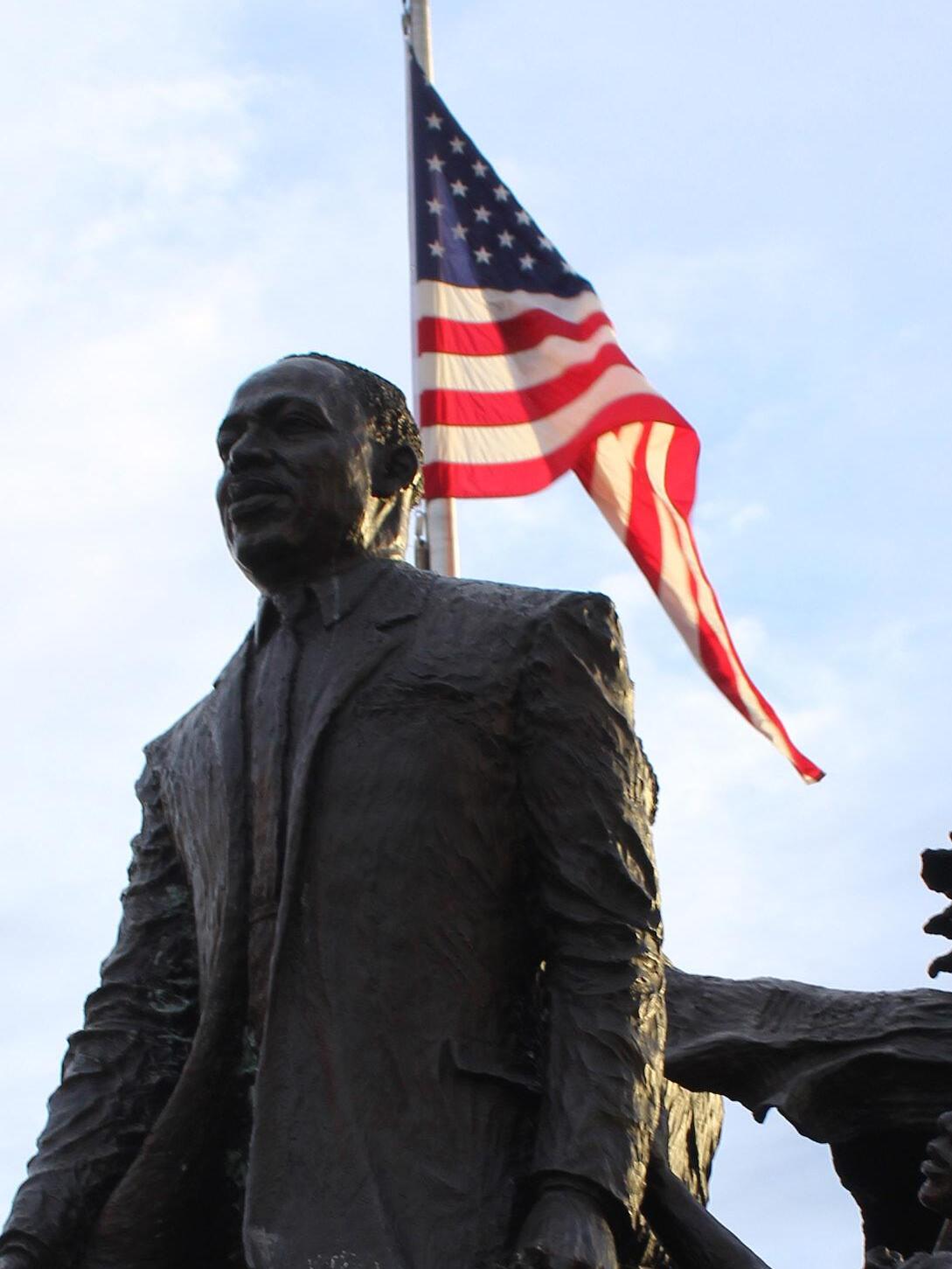


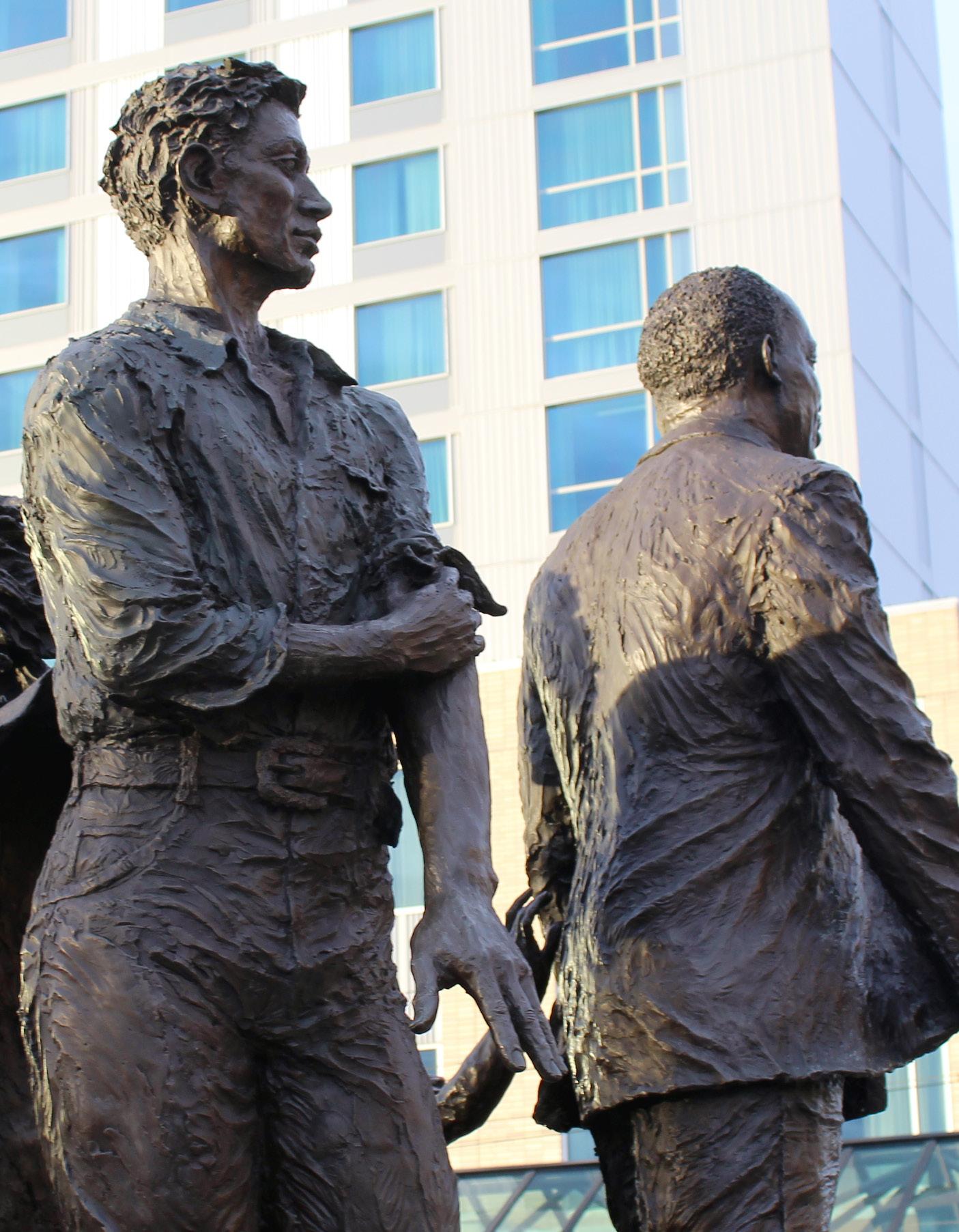
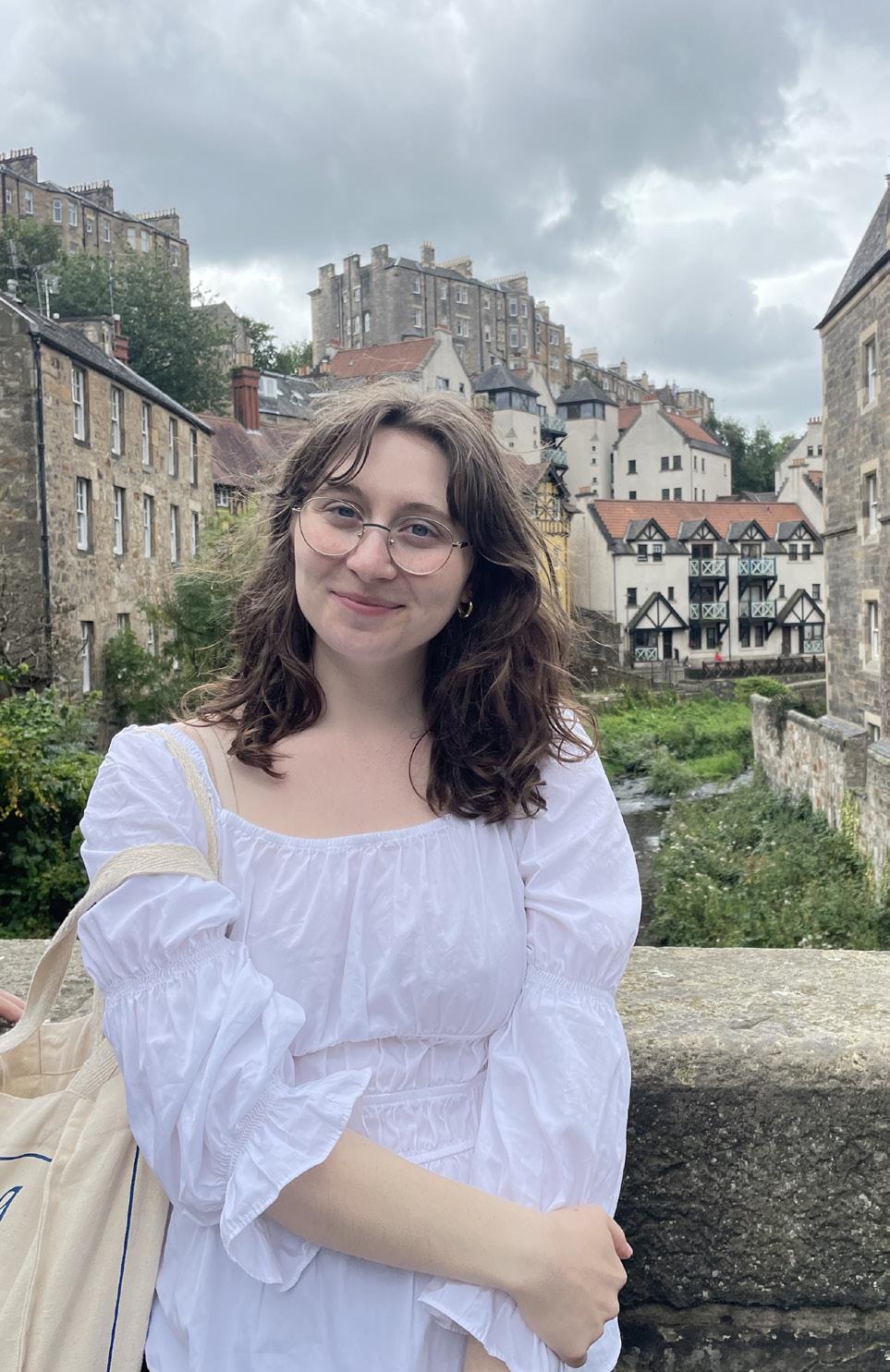

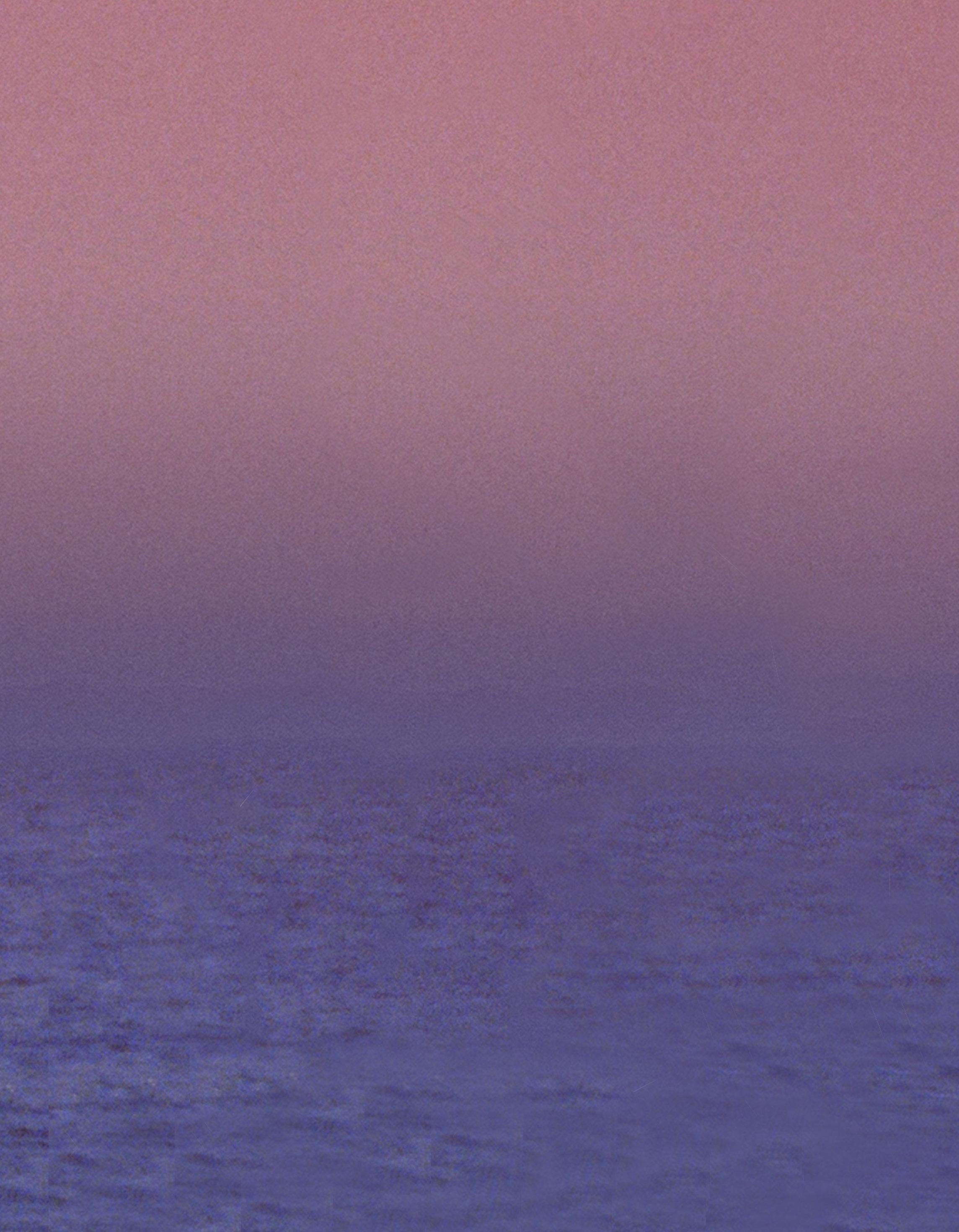

 BY WILL BOECHLER
A beautiful, challenging portrait of black motherhood
BY WILL BOECHLER
A beautiful, challenging portrait of black motherhood




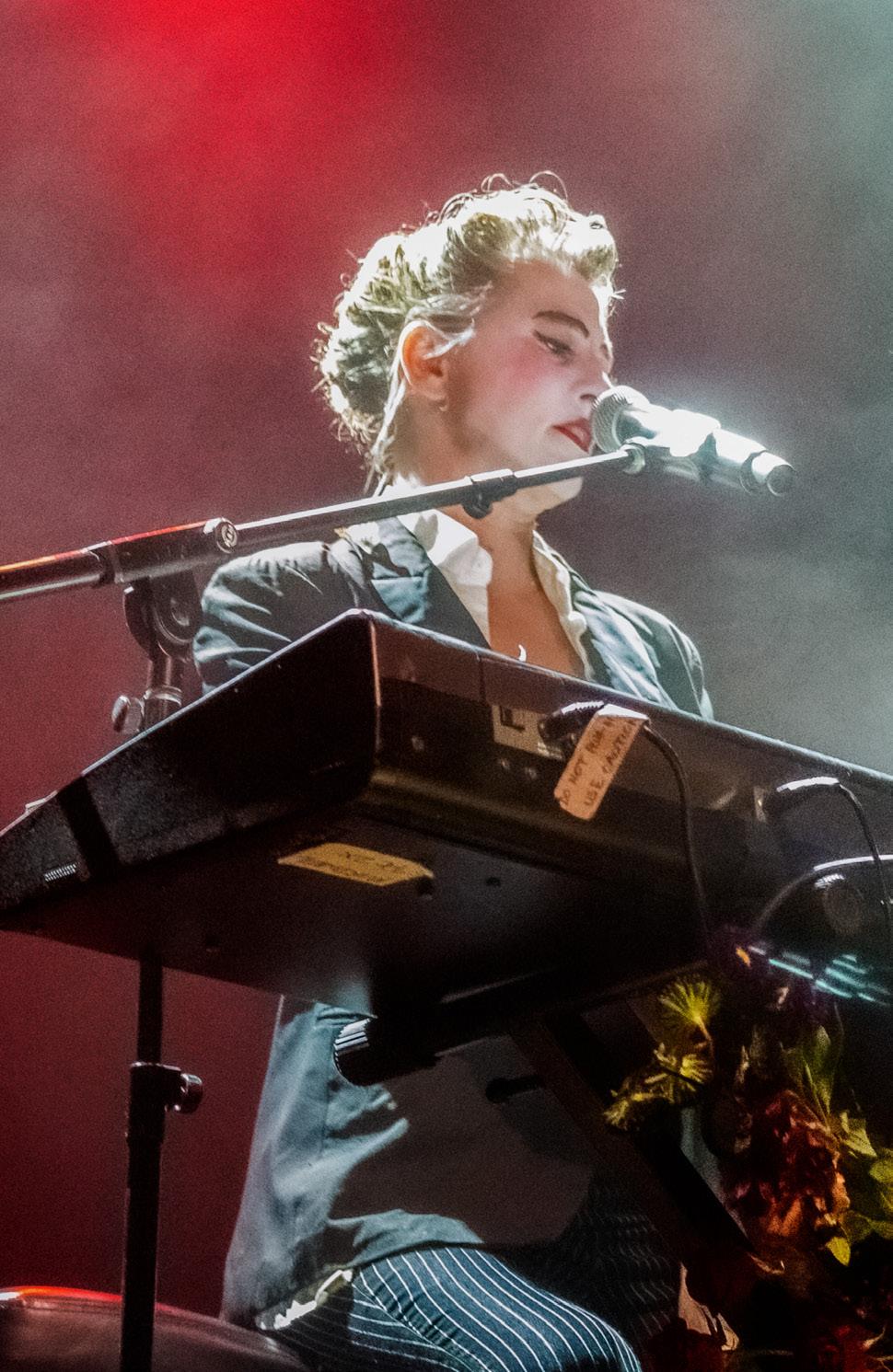






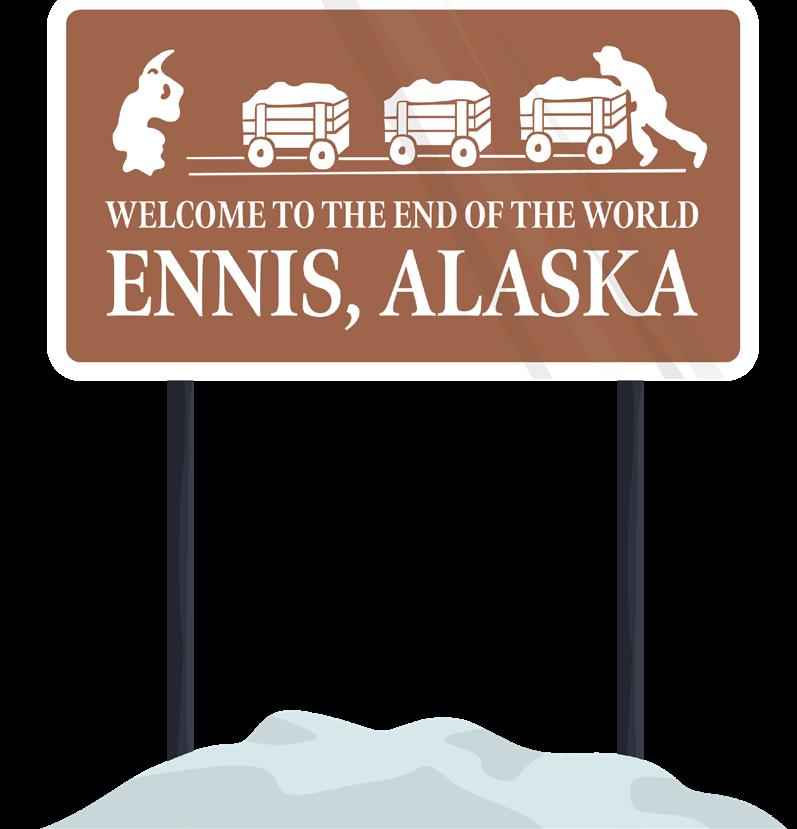

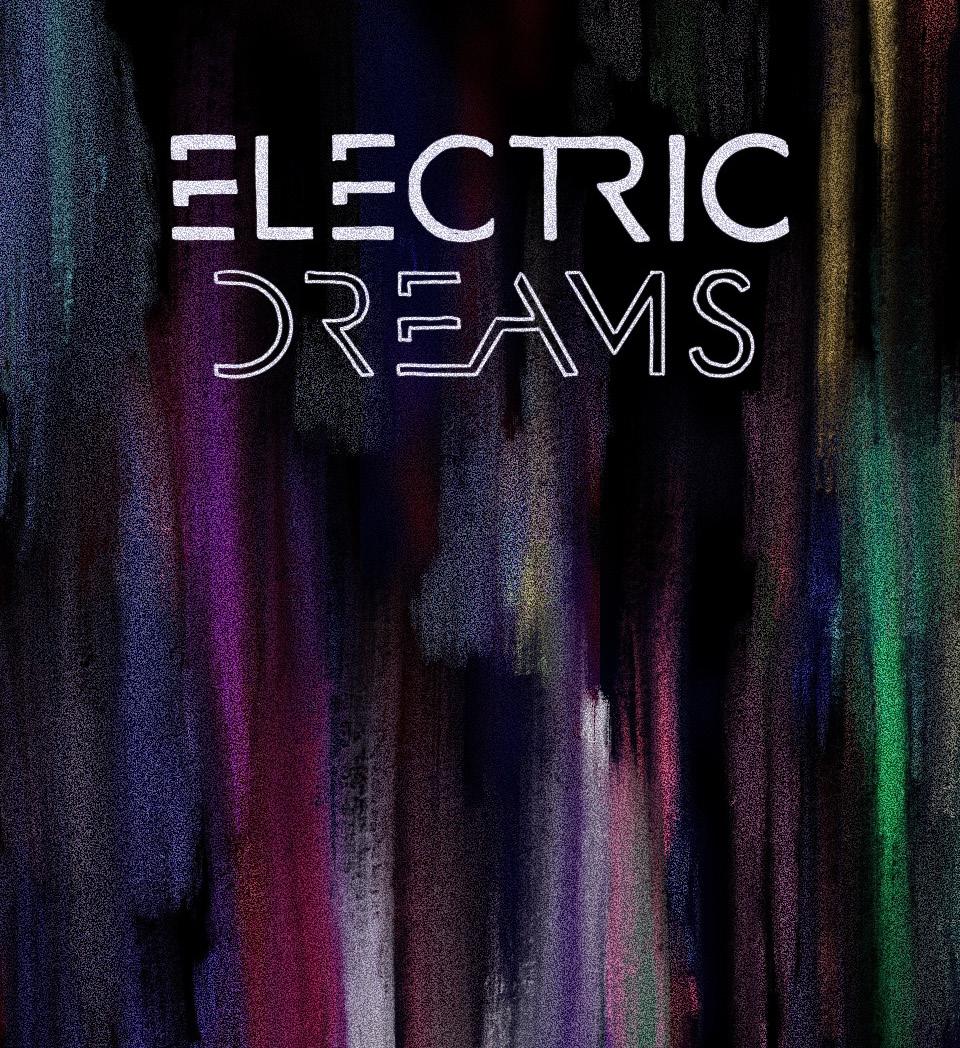
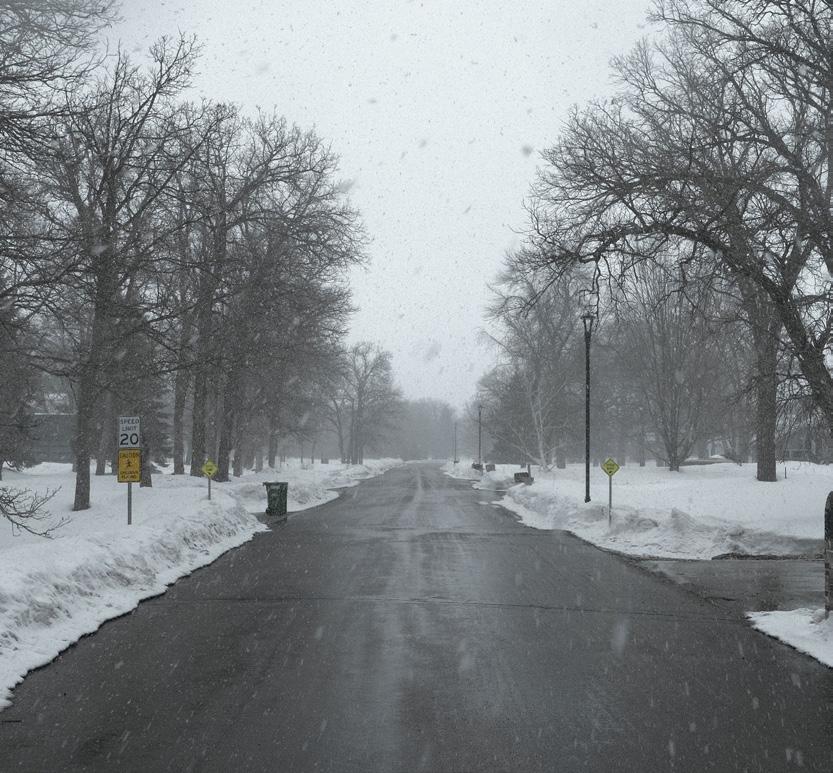

 COMICS BY PEYTEN WOODRUFF
COMICS BY PEYTEN WOODRUFF

